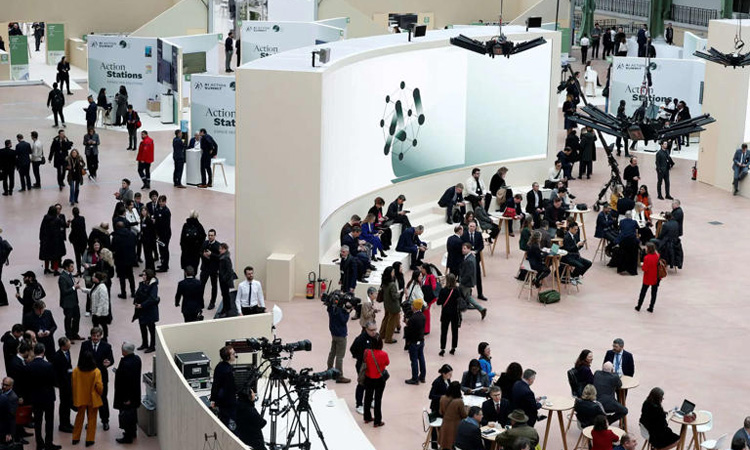
PARIS, Feb 11 (NNN-AGENCIES) — World leaders were set to hold formal talks in Paris on Tuesday on artificial intelligence (AI), seeking elusive common ground on a technology subject to a global race for promised economic benefits.
Hosted by French President Emmanuel Macron and Indian Prime Minister Narendra Modi, the gathering comes hours after Elon Musk reportedly put in a bid for star developer OpenAI, underscoring AI’s potential to gather power into a single pair of hands.
Attempts to reach global agreement may also frustrate major powers such as the United States and China, which have their own geopolitical tech priorities.
Media reports suggest that neither Britain nor the US — two leading countries for AI development — will sign a planned joint declaration as it stands.
“Good AI governance” requires “clear rules that foster the acceptance of AI technologies”, German Chancellor Olaf Scholz was to tell counterparts, according to a draft of his speech.
Tech and political leaders are expected to arrive at the opulent Grand Palais from 8:45 am before the plenary session begins at 10 am.
Among them will be US Vice President JD Vance, Chinese Vice Premier Zhang Guoqing and European Commission chief Ursula von der Leyen.
Outside observers criticised an alleged leaked draft of the joint statement for failing to mention AI’s suspected threat to humanity’s future as a species.
The supposed draft “fails to even mention these risks” said Max Tegmark, head of the US-based Future of Life Institute, which has warned of AI’s “existential risk”.
In recent weeks, the United States’ $500 billion “Stargate” programme led by ChatGPT maker OpenAI, and the emergence of the high-performing, low-cost Chinese start-up DeepSeek, have brought into focus the technical challenges and price of entry for nations hoping to keep abreast on AI.
Meanwhile, the Musk-led $97.4-billion bid for OpenAI reported by the Wall Street Journal would compound the tech influence of the world’s richest man, already boss of X, Tesla, SpaceX and his own AI developer xAI as well as a confidant of US President Donald Trump.
Sam Altman, the OpenAI chief set to speak in Paris later Tuesday, responded to the reported offer with a dry “no thank you” on X.
For France, Macron vowed Monday to blast through red tape to build AI infrastructure in his bid to keep Europe competitive.
“We will adopt the Notre Dame de Paris strategy” of streamlined procedures that saw France rebuild the landmark cathedral within five years of its devastation in a 2019 fire, he said.
Macron’s push to highlight French competitiveness saw him repeatedly trumpet 109 billion euros ($113 billion) to be invested in French AI in the coming years.
He has also hailed France’s extensive fleet of nuclear plants as a key advantage providing clean, scalable energy supply for AI’s vast processing needs.
“I have a good friend in the other part of the ocean saying ‘drill, baby, drill’,” Macron said in a reference to Trump’s pro-fossil fuels policy.
“Here there is no need to drill, it’s plug, baby, plug!” he said.
EU Commission chief von der Leyen is expected to make further announcements on the bloc’s competitiveness on Tuesday.
Away from the political pageantry, OpenAI’s Altman was to address business leaders later Tuesday at the Station F tech campus in southeast Paris, founded by French telecoms billionaire Xavier Niel.
Altman mused in a blog post Monday that with ever more powerful AI systems on the horizon, “it does seem like the balance of power between capital and labour could easily get messed up” in the near future.
On Monday, high-profile summit attendees had warned against squandering the technology’s economic promise in the shorter term.
World Trade Organization chief Ngozi Okonjo-Iweala said “near universal adoption of AI… could increase trade by up to 14 percentage points” from its current trend.
But global “fragmentation” of regulations on the technology and data flows could see both trade and output contract, she said.
In the workplace, AI is mostly replacing humans in clerical jobs disproportionately held by women, International Labour Organization head Gilbert Houngbo said.
That risks widening the gender pay gap even though more jobs are being created than destroyed by AI on current evidence, he added. — NNN-AGENCIES






